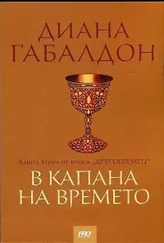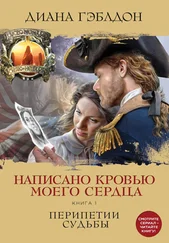Диана Гэблдон - Drums of Autumn 4
Здесь есть возможность читать онлайн «Диана Гэблдон - Drums of Autumn 4» весь текст электронной книги совершенно бесплатно (целиком полную версию без сокращений). В некоторых случаях можно слушать аудио, скачать через торрент в формате fb2 и присутствует краткое содержание. Год выпуска: 2010, ISBN: 2010, Издательство: Random House Publishing Group, Жанр: Старинная литература, на английском языке. Описание произведения, (предисловие) а так же отзывы посетителей доступны на портале библиотеки ЛибКат.
- Название:Drums of Autumn 4
- Автор:
- Издательство:Random House Publishing Group
- Жанр:
- Год:2010
- ISBN:9780440335177
- Рейтинг книги:4 / 5. Голосов: 1
-
Избранное:Добавить в избранное
- Отзывы:
-
Ваша оценка:
- 80
- 1
- 2
- 3
- 4
- 5
Drums of Autumn 4: краткое содержание, описание и аннотация
Предлагаем к чтению аннотацию, описание, краткое содержание или предисловие (зависит от того, что написал сам автор книги «Drums of Autumn 4»). Если вы не нашли необходимую информацию о книге — напишите в комментариях, мы постараемся отыскать её.
Drums of Autumn 4 — читать онлайн бесплатно полную книгу (весь текст) целиком
Ниже представлен текст книги, разбитый по страницам. Система сохранения места последней прочитанной страницы, позволяет с удобством читать онлайн бесплатно книгу «Drums of Autumn 4», без необходимости каждый раз заново искать на чём Вы остановились. Поставьте закладку, и сможете в любой момент перейти на страницу, на которой закончили чтение.
Интервал:
Закладка:
“It’s where my sporran would be, did I have one. So long as I dinna meet with a quick-fingered harlot, I’m safe.”
I glanced at the slightly bulging front of his breeches, and then up at him. Broad-shouldered and tall, with bold, clean features and a Highlander’s proud carriage, he drew the glance of every woman he passed, even with his bright hair covered by a sober blue tricorne. The breeches, which were borrowed, were substantially too tight, and did nothing whatever to detract from the general effect—an effect enhanced by the fact that he himself was totally ignorant of it.
“You’re a walking inducement to harlots,” I said. “Stick by me; I’ll protect you.”
He laughed and took my arm as we emerged into a small clear space.
“Ian!” he shouted, catching sight of his nephew over the heads of the crowd. A moment later, a tall, stringy gawk of a boy popped out of the crowd, pushing a thatch of brown hair out of his eyes and grinning widely.
“I thought I should never find ye, Uncle!” he exclaimed. “Christ, there are more folk here than at the Lawnmarket in Edinburgh!” He wiped a coat sleeve across his long, half-homely face, leaving a streak of grime down one cheek.
Jamie eyed his nephew askance.
“Ye’re lookin’ indecently cheerful, Ian, for having just seen a man go to his death.”
Ian hastily altered his expression into an attempt at decent solemnity.
“Oh, no, Uncle Jamie,” he said. “I didna see the hanging.” Duncan raised one brow and Ian blushed slightly. “I—I wasna afraid to see; it was only I had…something else I wanted to do.”
Jamie smiled slightly and patted his nephew on the back.
“Don’t trouble yourself, Ian; I’d as soon not have seen it myself, only that Gavin was a friend.”
“I know, Uncle. I’m sorry for it.” A flash of sympathy showed in the boy’s large brown eyes, the only feature of his face with any claim to beauty. He glanced at me. “Was it awful, Auntie?”
“Yes,” I said. “It’s over, though.” I pulled the damp handkerchief out of my bosom and stood on tiptoe to rub away the smudge on his cheek.
Duncan Innes shook his head sorrowfully. “Aye, poor Gavin. Still, it’s a quicker death than starving, and there was little left for him but that.”
“Let’s go,” Jamie interrupted, unwilling to spend time in useless lamenting. “The Bonnie Mary should be near the far end of the quay.” I saw Ian glance at Jamie and draw himself up as though about to speak, but Jamie had already turned toward the harbor and was shoving his way through the crowd. Ian glanced at me, shrugged, and offered me an arm.
We followed Jamie behind the warehouses that lined the docks, side-stepping sailors, loaders, slaves, passengers, customers and merchants of all sorts. Charleston was a major shipping port, and business was booming, with as many as a hundred ships a month coming and going from Europe in the season.
The Bonnie Mary belonged to a friend of Jamie’s cousin Jared Fraser, who had gone to France to make his fortune in the wine business and succeeded brilliantly. With luck, the Bonnie Mary ’s captain might be persuaded for Jared’s sake to take Ian with him back to Edinburgh, allowing the boy to work his passage as a cabin lad.
Ian was not enthused at the prospect, but Jamie was determined to ship his errant nephew back to Scotland at the earliest opportunity. It was—among other concerns—news of the Bonnie Mary ’s presence in Charleston that had brought us here from Georgia, where we had first set foot in America—by accident—two months before.
As we passed a tavern, a slatternly barmaid came out with a bowl of slops. She caught sight of Jamie and stood, bowl braced against her hip, giving him a slanted brow and a pouting smile. He passed without a glance, intent on his goal. She tossed her head, flung the slops to the pig who slept by the step, and flounced back inside.
He paused, shading his eyes to look down the row of towering ships’ masts, and I came up beside him. He twitched unconsciously at the front of his breeches, easing the fit, and I took his arm.
“Family jewels still safe, are they?” I murmured.
“Uncomfortable, but safe,” he assured me. He plucked at the lacing of his flies, grimacing. “I would ha’ done better to hide them up my bum, I think.”
“Better you than me, mate,” I said, smiling. “I’d rather risk robbery, myself.”
The family jewels were just that. We had been driven ashore on the coast of Georgia by a hurricane, arriving soaked, ragged, and destitute—save for a handful of large and valuable gemstones.
I hoped the captain of the Bonnie Mary thought highly enough of Jared Fraser to accept Ian as a cabin boy, because if not, we were going to have a spot of difficulty about the passage.
In theory, Jamie’s pouch and my pocket contained a sizable fortune. In practice, the stones might have been beach pebbles so far as the good they were to us. While gems were an easy, compact way of transporting wealth, the problem was changing them back into money.
Most trade in the southern colonies was conducted by means of barter—what wasn’t, was handled by the exchange of scrip or bills written on a wealthy merchant or banker. And wealthy bankers were thin on the ground in Georgia; those willing to tie up their available capital in gemstones rarer still. The prosperous rice farmer with whom we had stayed in Savannah had assured us that he himself could scarcely lay his hand on two pounds sterling in cash—indeed, there was likely not ten pounds in gold and silver to be had in the whole colony.
Nor was there any chance of selling one of the stones in the endless stretches of salt marsh and pine forest through which we had passed on our journey north. Charleston was the first city we had reached of sufficient size to harbor merchants and bankers who might help to liquidate a portion of our frozen assets.
Not that anything was likely to stay frozen long in Charleston in summer, I reflected. Rivulets of sweat were running down my neck and the linen shift under my bodice was soaked and crumpled against my skin. Even so close to the harbor, there was no wind at this time of day, and the smells of hot tar, dead fish, and sweating laborers were nearly overwhelming.
Despite their protestations, Jamie had insisted on giving one of our gemstones to Mr. and Mrs. Olivier, the kindly people who had taken us in when we were shipwrecked virtually on their doorstep, as some token of thanks for their hospitality. In return, they had provided us with a wagon, two horses, fresh clothes for traveling, food for the journey north, and a small amount of money.
Of this, six shillings and threepence remained in my pocket, constituting the entirety of our disposable fortune.
“This way, Uncle Jamie,” Ian said, turning and beckoning his uncle eagerly. “I’ve got something to show ye.”
“What is it?” Jamie asked, threading his way through a throng of sweating slaves, who were loading dusty bricks of dried indigo into an anchored cargo ship. “And how did ye get whatever it is? Ye havena got any money, have you?”
“No, I won it, dicing.” Ian’s voice floated back, his body invisible as he skipped around a cartload of corn.
“Dicing! Ian, for God’s sake, ye canna be gambling when ye’ve not a penny to bless yourself with!” Holding my arm, Jamie shoved a way through the crowd to catch up to his nephew.
“You do it all the time, Uncle Jamie,” the boy pointed out, pausing to wait for us. “Ye’ve been doing it in every tavern and inn where we’ve stayed.”
“My God, Ian, that’s cards, not dice! And I know what I’m doing!”
“So do I,” said Ian, looking smug. “I won, no?”
Читать дальшеИнтервал:
Закладка:
Похожие книги на «Drums of Autumn 4»
Представляем Вашему вниманию похожие книги на «Drums of Autumn 4» списком для выбора. Мы отобрали схожую по названию и смыслу литературу в надежде предоставить читателям больше вариантов отыскать новые, интересные, ещё непрочитанные произведения.
Обсуждение, отзывы о книге «Drums of Autumn 4» и просто собственные мнения читателей. Оставьте ваши комментарии, напишите, что Вы думаете о произведении, его смысле или главных героях. Укажите что конкретно понравилось, а что нет, и почему Вы так считаете.
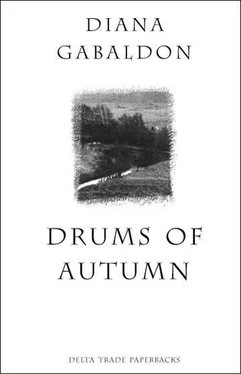
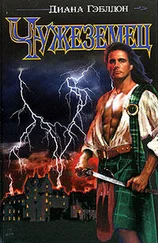
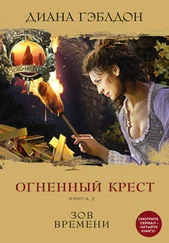
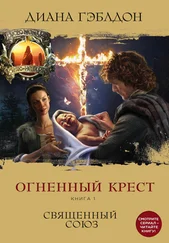
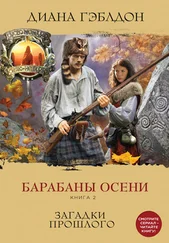
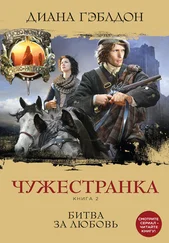
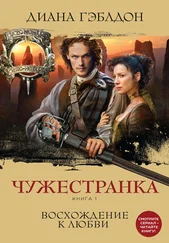
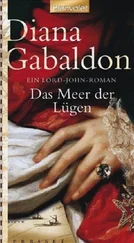


![Диана Гэблдон - Дыхание снега и пепла. Книга 2. Голос будущего [litres]](/books/421947/diana-gebldon-dyhanie-snega-i-pepla-kniga-2-golo-thumb.webp)
